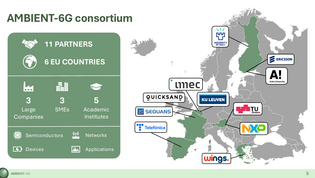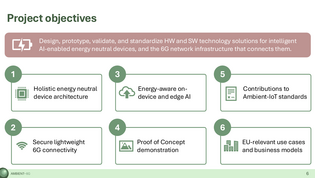AMBIENT-6G
Internet of Things technology is widely recognised as having the potential to tackle some of the world’s biggest challenges. However, for it to truly benefit society, the technology gap that exists in powering the growing number of wirelessly connected sensors needs to be addressed. Specifically, such sensors currently rely on primary batteries, which require frequent maintenance and replacement.
AMBIENT-6G aims to address this issue, and overcome the exorbitant environmental and economic impact of battery maintenance and replacement. To this end, the project proposes a new class of energy neutral devices. They exploit ambient energy harvested from the environment to achieve decades-long maintenance-free energy autonomy. Additionally, the AMBIENT-6G project will investigate how the future 6G network infrastructure needs to be adapted to seemlessly connect these devices to the Internet.
Further information: AMBIENT-6G project

